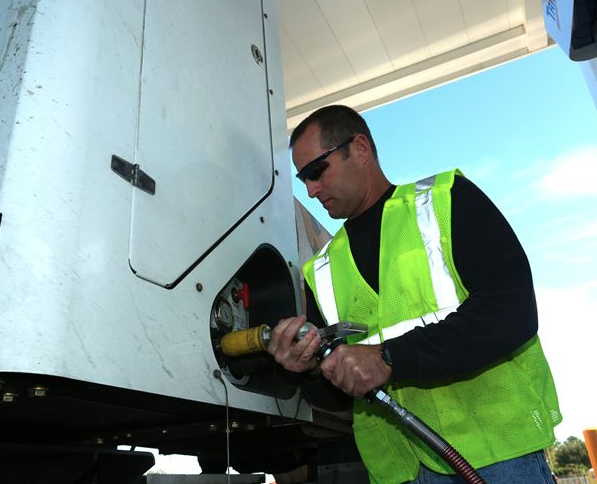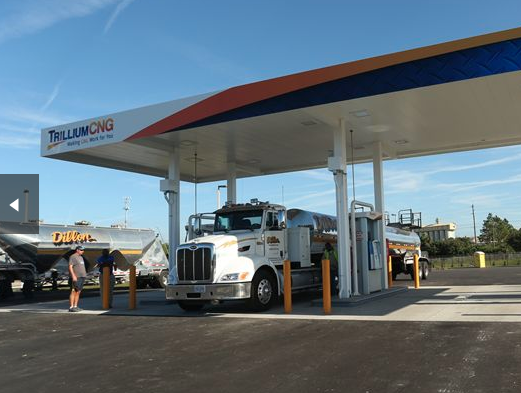Tampa Compressed Natural Gas Station Shows Trend
 Courtesy of Tampa Bay Times: This gas station, tucked behind a Circle K at 50th Street and Madison Avenue, looks pretty much like any other. There are fuel pumps, credit card slots and ticking price gauges. It’s what comes out of the pumps that’s different.
Courtesy of Tampa Bay Times: This gas station, tucked behind a Circle K at 50th Street and Madison Avenue, looks pretty much like any other. There are fuel pumps, credit card slots and ticking price gauges. It’s what comes out of the pumps that’s different.
Compressed natural gas, or CNG, is a fuel alternative gaining popularity among trucking companies for its low cost and environmentally friendly status. And now it’s accessible to the public, too.
Trillium CNG, in partnership with Dillon Transport and Mosaic, opened the area’s first public compressed natural gas station in November. The companies teamed up to build the station after converting about 100 Dillon Transport trucks to CNG, said Nick Saban, Dillon’s terminal leader for Tampa and Mulberry.
The fleet services Mosaic in both cities, hauling more than 500 loads a day of raw materials like sulfuric acid and lime dust.
Converting to CNG will save money and reduce pollution, Saban said.
“From an environmental standpoint, natural gas is domestically produced and we have an abundance of it — over 100 years’ worth,” Saban said. “From a price standpoint, it’s a much more stable fuel than diesel.”
Natural gas burns cleaner than gasoline or diesel, according to the U.S. Department of Energy, because of its lower carbon content.
Though CNG is measured differently than gasoline and fuel because it’s pressurized, the price is equivalent to about $2.19 a gallon, Saban said.
But it requires a specially equipped vehicle to take advantage of the cost savings.
CNG-powered vehicles are still a relatively new concept in the United States. Natural gas powers less than half a million vehicles in the States, said Anddrikk Frazier, regional director of business development for Trillium CNG.
Many of those vehicles are in fleets, which have the ability to fuel at a central location and stay in limited geographic regions, keeping them close to the limited number of CNG stations.
But CNG also is an option for everyday drivers.
Several vehicle manufacturers produce CNG versions of popular cars, including the Honda Civic. Others, like General Motors, plan to release bi-fuel versions that can run on natural gas and gasoline in the coming years.
Some gasoline vehicles can be converted to CNG, though the process costs $5,000 to $20,000, Frazier said.
“People who are conscious of the environment and people who burn a lot of fuel are the ones who will benefit,” Frazier said.
 Expecting initial conversion costs to decline and CNG vehicles to increase, Trillium CNG is building more stations. The company plans to open a second Tampa station, at 50th Street and Columbus Avenue, next year.
Expecting initial conversion costs to decline and CNG vehicles to increase, Trillium CNG is building more stations. The company plans to open a second Tampa station, at 50th Street and Columbus Avenue, next year.
Government agencies are recognizing the benefits of CNG as well.
Hillsborough Area Regional Transit Authority announced plans this month to become the first transit agency in the state to convert from diesel to CNG.
Construction is under way on a CNG station on 21st Avenue that is expected to be complete by spring. HART expects to have 89 CNG vehicles in service by the end of 2015, including vans and buses.
There’s an incentive for other Florida agencies and companies to convert.
The Florida Department of Agriculture and Consumer Services will accept applications starting in January for rebates for up to 50 percent of the cost, up to $25,000.
Author: Shelley Rossetter.
Category: Fuel & Oil, General Update









